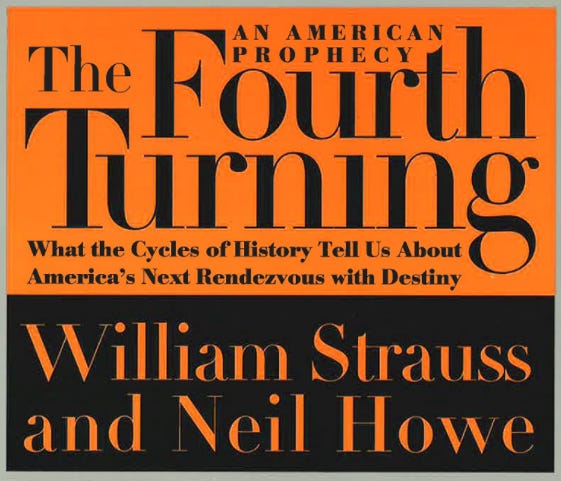Why the Study of History Matters
“A fourth turning can be long and difficult, brief and severe, but perhaps mild. But like winter, it cannot be averted. It must come in its turn.” - William Strauss & Neil Howe
I find that the more one reads history, the more one understands the way in which the world and its people operate. As a result, there is less general shock and fewer confounding scenarios that can emerge. In other words, you are caught off guard less frequently because, theoretically, it’s all happened before.
William Strauss and Neil Howe wrote The Fourth Turning in 1997. It is remarkable how timeless this work has proven to be. In summary, the authors argue that life takes on the character of 80 year cycles, which more or less reflect the lifespan of human beings. As such, generations — people born around the same time period — tend to share numerous and broad characteristics, which theoretically allows sociologists, anthropologists, and geopolitical analysts to make certain forecasts about what the future may hold.
Below is an excerpt from this book written more than twenty years ago (emphasis mine):
Suppose a global terrorist group blows up an aircraft and announces it possesses portable nuclear weapons. The United States and its allies launch a preemptive strike. The terrorists threaten to retaliate against an American city. Congress declares war and authorizes unlimited house-to-house searches. Opponents charge that the president concocted the whole emergency for political purposes. A nationwide strike is declared. Foreign capital flees the United States…
Or picture the Centers for Disease Control and Prevention announcing the spread of a new communicable virus. The disease reaches densely populated areas, killing some. Congress enacts mandatory quarantine measures. The president orders the National Guard to throw prophylactic cordons around unsafe neighborhoods. Mayors resist. Urban gangs battle suburban militias. Calls mount for the president to declare martial law.
Lastly, suppose growing anarchy throughout the former Soviet republics prompts Russia to conduct training exercises around its borders. Lithuania erupts in civil war. Poland dissolves its parliament. U.S. diplomats are captured and publicly taunted. The president airlifts troops to rescue them and orders ships into the Baltic Sea. Iran declares its alliance with Russia. Oil prices soar. Congress debates restoring the draft.
Definitely worth a read!
Regards,
John


